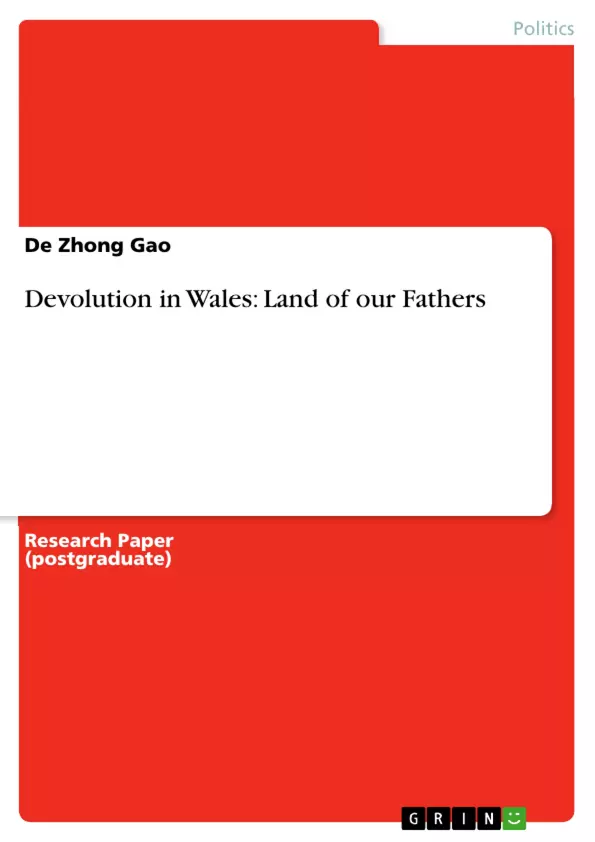In the context of devolutionary Britain, Scotland, Northern Ireland and Wales have all undergone profound administrative and political changes. Particularly in Wales, devolutionary policies have revived Welsh culture and nationalism and taken a politicized standing in advancing concessions from London. This essay will explore the political and socio-economic factors, and consequences of Welsh nationalism, and how grand theories of nationalism studied political theory can help us better comprehend Welsh nationalism.
Inhaltsverzeichnis (Table of Contents)
- Introduction
- The Origins of Early Welsh Nationalism
- The Welsh Language and Culture
- The Rise of Welsh Nationalism
- The Impact of Devolution
- Education and the Welsh Language
- Social Institutions and Welfare Policies
- Conclusion
Zielsetzung und Themenschwerpunkte (Objectives and Key Themes)
This paper explores the development of devolution in Wales, examining how distinct welfare policies, educational programs, and the emergence of Welsh civic institutions have contributed to its progress. The paper analyzes the origins of early Welsh nationalism in the nineteenth century and its evolution in the twentieth century, focusing on the impact of devolution on education and the preservation of Welsh culture and language. Additionally, it investigates various social institutions and their welfare policies in post-devolutionary Wales. Key themes explored in the paper include:- The role of education in shaping Welsh identity and preserving Welsh culture
- The influence of early Welsh nationalist movements on the development of devolution
- The impact of devolution on social institutions and welfare policies in Wales
- The interplay between ethnic demands, nationalism, and the devolution of power
- The significance of cultural institutions and language preservation in the context of national identity
Zusammenfassung der Kapitel (Chapter Summaries)
The paper begins by tracing the origins of Welsh nationalism back to the nineteenth century, highlighting the importance of preserving the Welsh language and culture in the face of cultural assimilation. The early Welsh nationalist movement emerged from a deep concern about the erosion of Welsh identity due to the dominance of English language and culture. This movement was largely driven by a desire to promote Welsh education and cultural institutions as a means of preserving Welsh heritage.
The paper then explores the impact of devolution on education in Wales. The paper examines the establishment of Welsh-language schools and universities, highlighting their role in fostering a stronger Welsh identity and preserving the Welsh language. It also analyzes the influence of devolution on social institutions and welfare policies, demonstrating how these policies have contributed to the development of a distinct Welsh identity and social fabric.
Schlüsselwörter (Keywords)
This paper delves into the significant themes of devolution, Welsh nationalism, cultural preservation, education, social institutions, and welfare policies. It focuses on the impact of devolution on Welsh identity, language, and culture, and explores the interplay between ethnic demands, national consciousness, and political reforms in the context of the United Kingdom.Frequently Asked Questions
What is devolution in the context of Wales?
Devolution refers to the administrative and political process of transferring powers from the central government in London to the National Assembly for Wales.
How has devolution impacted the Welsh language?
Devolutionary policies have actively promoted Welsh-language schools and universities, fostering a stronger national identity and preserving Welsh culture.
What are the origins of early Welsh nationalism?
It emerged in the nineteenth century as a response to cultural assimilation, driven by a desire to protect Welsh identity and language from English dominance.
How do social institutions differ in post-devolutionary Wales?
Wales has developed distinct welfare policies and social institutions that reflect its specific socio-economic needs and national fabric.
What role does education play in Welsh national identity?
Education is central to shaping identity; the establishment of Welsh-centric curricula and institutions is a key tool in maintaining national consciousness.
- Quote paper
- De Zhong Gao (Author), 2011, Devolution in Wales: Land of our Fathers, Munich, GRIN Verlag, https://www.grin.com/document/188284



